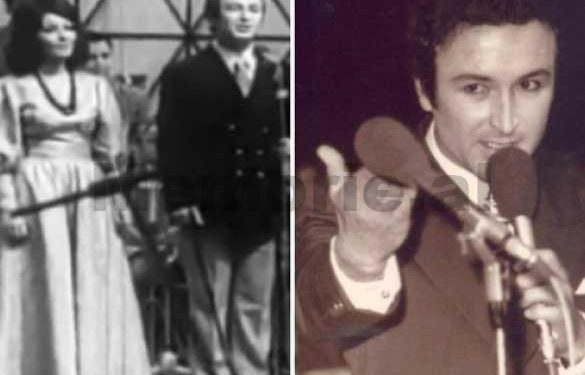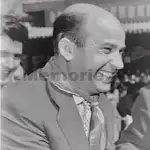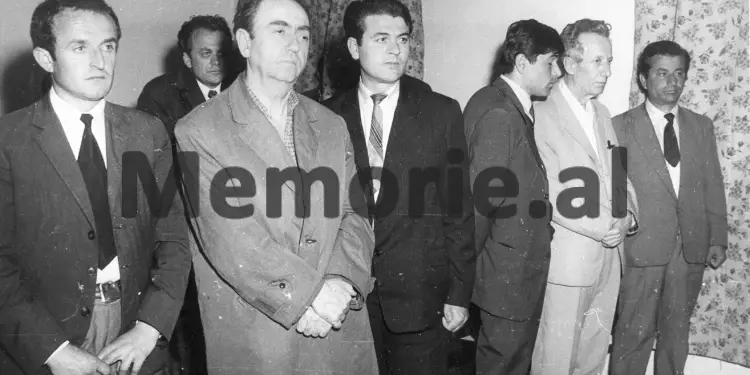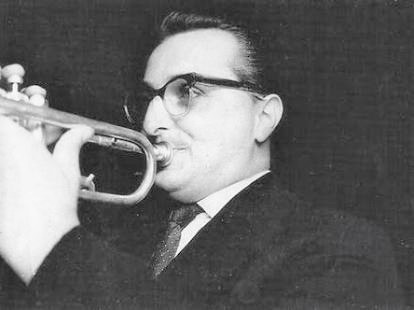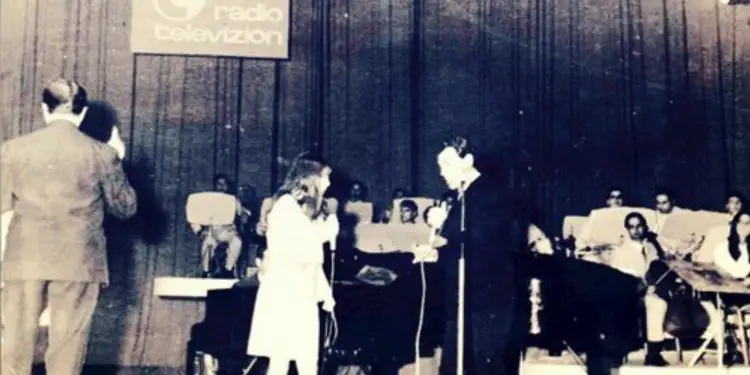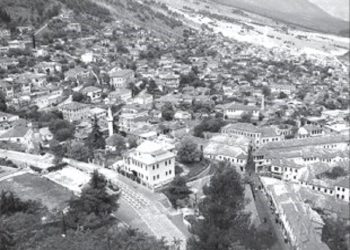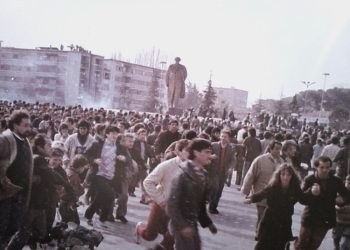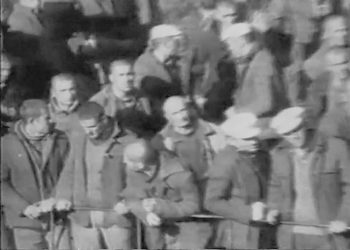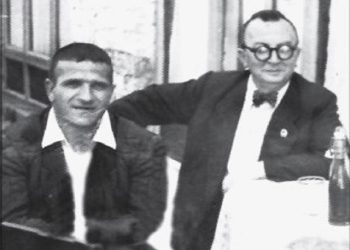From Skifter Kelliçi
The seventh part
Memorie.al / It are the fourth time that I am writing about the 11th National Song Festival on Albanian Radio Television, (December 22-25, 1972), as much as I wrote some time ago about the Tirana Conference, (16- April 20, 1956). And this time for the same reason: for the lack of historical accuracy of some events related to this festival, which Ramiz Alia, the former first secretary of PPSh, after the death of Enver Hoxha, describes in the book his last “My Life” (2010), although there are objective, honest statements in it, especially when he testifies about the serious mistakes that led to the failure of the communist system in Albania, led by Enver Hoxha, for which he apologizes. But in the description of his figure, Ramiz Alia is often contradictory, especially in the chapter; “The fight against liberalism”, where it stops at the 11th Song Festival on Albanian Radio and Television (December 22-25, 1972).
Continues from last issue
Other punishments…!
But let’s go back to Todi Lubonja. On April 11, 1973, he was transferred from RTSh and was appointed director of the Water Company in Lezhë. Before he finally left, when he was leaving the office one day, I happened to be in front of him. He saw me and it seemed as if he said to me: “Don’t meet me, because it’s not the case…”! And so I did. But not with Mihal Luaras, who, when we worked together at RTSh, had asked me for any suggestions for the speakers he was trying for TV shows, we had also discussed artistic and sports issues.
There was a period when he got sick. I went home, somewhere near the “Block” of the leaders, where I found him lying in bed, surrounded by his actors, directors, former students. It was my last meeting with him. From the beginning of April, he was forcibly sentenced to be educated, working at a construction site in Ballsh. His wife, the well-known actress Edi, presenter of the 11th Festival, graduated from the People’s Theater and worked in a tailor shop.
Bujar Kapexhiu, also the presenter of this festival, suffered the same fate – a worker at the Brick Factory. Gaspë Çurçia, the conductor of the small wind orchestra, was thrown by the RTS orchestra, somewhere in a lost corner. The young singer, Justina Aliaj, a director at the RTS, who had sung the song “Para ekranit te televizirit” very beautifully, criticized for mannerisms, moved to Shkodër. And when she returned to Tirana married, by order of the Party Committee of Tirana, she was not allowed to work anywhere, except as a worker at N.I.SH. Learning Tools.
There was even worse: Sherif Merdani, who sang two songs at the festival, was arrested and sentenced as a singer “with influences of decadent western music”, which he had also performed at the 11th Festival. In the first days of June of that year, sent by the Central Committee of the Party, Pipi Mitrojorgji, a well-known figure in the field of culture, publicist and literary critic, came to RTSh, who met with some of the experienced editors among whom I was. He spoke to us for a long time.
What really impressed me was that he emphasized that Albania was already “the only country in the world that was building socialism”, an expression that Enver Hoxha himself would later make public, after the disputes with China came to light, which would as a consequence, the complete isolation of our country from the world. To tell the truth, it made me laugh, from such an absurd definition, which, probably, even Pipi Mitrojorgji did not approve.
But then, I could barely hold back a cry, when I heard these words from his mouth: “Work carefully and vigilantly, to eliminate as soon as possible, the traces of Todi Lubonja’s hostile work in RTSh”! In those moments, it seemed to me that his lips trembled when he uttered these words, because even he, who had Todi as a friend and colleague, could never believe in their truth. Todi Lubonja, enemy of the Party…?!
It cannot even be doubted that the entire scenario to convict Todi Lubonja and then Fadil Paçram was designed and written by Enver Hoxha and no one else. In fact, he had not even received an opinion from any of his closest collaborators, starting with Hysni Kapo and Mehmet Shehu, let alone the other members of the Political Bureau!
From the day the Festival ended, we did not hear openly or privately any of their opinions about the Festival. So, Mehmet Shehu, when something came to his mind, did not hesitate to make immediate remarks about what he did not like in RTSh. It is enough to mention only one fact: Petrit Leka, the presenter of the time behind “TV Magazine”, remained off the screen for a few weeks, only that the prime minister, one day, said that he looked a lot like Bernaka, the presenter of the time at RAI.
But how did this pretty festival, which continued to be broadcast for four consecutive nights, on the RTS screen, not make a bad impression on him?! Yes, just as Manush Mufti, member of the Political Bureau and first secretary of the Tirana Party Committee, did not have the same impression of what was happening before and during the development of the festival and conveyed these impressions to him at least Nefo’s, his wife’s?! As you know, I wrote above about the opinion of Ramiz Ali, secretary of the Central Committee, about the ideological problems related to this problem.
Then, the question arises. These two, were they not responsible for this festival, which “Voice of the People” and “Drita”, from the middle of March 1973, as it has been pointed out, called; “ugly copies of bourgeois-revisionist art”?
It is understood that, as long as Todi Lubonja was declared an enemy before the 4th Plenum, which was to be held at the end of June, Ramiz Alia, Manush Muftiu and, of course, his wife, Nefoja, who was, should also be declared enemies director of Radio Tirana, the direct organizer of the 11th Festival and, above all, as I said, a very close woman in relations with the employees. And it’s good that the work did not reach this point…!
However, if Enver Hoxha hit Ramiz Ali, he would hit himself. It had not happened, after 1960, when the dictator declared Liri Belishova, a member of the Politburo, an “agent of Soviet revisionism”, that he condemned any member of the Bureau, who worked in the Central Committee, and was even the chief of ideology. As a result, Enver Hoxha singled out Ramiz and Manushi from the sins of the 11th Festival and charged them to Todi Lubonja and Fadil Paçrami, who were their direct subordinates, respectively in the Central Committee and the Tirana Party Committee.
Then, where is Enver Hoxha’s partisanship?!
This “partisanship” of Enver Hoxha is best explained by Marash Hayati, in his book, “The back door of the press”, when he writes about Ramiz Ali: “First, it was very difficult in the logic of things, that Ramiz Alia, the main leader in the ideological field, which included all the activity of science, education, culture, art, etc., was outside the center of that approaching ‘earthquake’…! Not only is that, but us in the press witnesses of his insistence that Todi Lubonja be put in charge of RTS at that time.
All this made us suspect, not without indifference, that after March, April, May, there could be new escalations in the fight against foreign shows, where Ramiz Alia could be included in them. But what our guess had a hard time conceiving, the future strategy was solved by Enver Hoxha himself, bringing Ramiz Ali to the fore…! Enver Hoxha deliberately took everything upon himself, so that Ramiz Alia would not be harmed”! (page 80).
This meant openly that, when his interest pleased him, he violated the principles, removed those who should not be declared enemies, pardoned them and even elevated them even higher, as he did later again with Ramiz Ali. The fact is that, if Ramiz Alia had ordered that at least the singers’ clothes should be changed, the jewelry should be removed, that the foreign shows should be avoided, Enver Hoxha would not have been able to catch up to them and start the attack on culture and art, as he did.
I express myself this way, because even the 2nd Radio Song Festival, in 1962, which I directed together with the well-known speaker, Vera Zheji, (at that time the Experimental TV Center could not broadcast outside the studio), in terms of the musical side, it was a copy of the 11th Festival. But even if the clothes were modern, Enver Hoxha would not react, as in the case of the 11th Festival, because he had no way of seeing it. However, he had set out to implement his diabolical plan, so he would find some other cause to destroy art and culture.
The 4th Plenum of the Central Committee and Enver Hoxha’s subsequent crimes!
It was held from June 26-28, 1973. Todi Lubonja, in the meantime, had been transferred to the director of the Water Company in Lezhë and, of course, continued to be a member of the Central Committee of the ALP. “It is understood that Fadil Pachrami and I, – Todi Lubonja told me, – everyone in the hall, stayed away from us. It was understandable. The trial was being held, which had only Enver Hoxha as prosecutor, president… So he was a “vali” himself, a “kadi” himself! I don’t remember, he declaimed as he wanted in a rude tone. He had, therefore, both the stone and the nut in his hand. I expected him to speak like that.
But, when among others, he described me as; “… right-wing deviator, who has supported pronounced liberal and opportunistic views, modernist aesthetic taste”, then that; “… tried to give Radio-Television a purely informative and cultural-knowledge direction, this direction was contrary to the orientations of the Central Committee, on its ideological and cultural-educational character”, with all the serious spiritual condition in which I had been for weeks, I smiled to myself at this aberration of our ‘genius ideologue’. I was a right-wing deviant, so I had no intention of implementing what was pointed out to me about Radio-Television?!
How was it possible that this great theoretician, who was “enriching Marxism-Leninism with new theses”, uttered such nonsense?! Just like Stalin, who accused Trotsky of right-wingism, exiled him, expelled him from Russia, and then in 1929, even killed him, when he had never been for the preservation of private property, for party pluralism, for the fight against communism, which are some of the goals of the right.
Since the 40s, I have embraced communist ideas with complete conviction and fought for their triumph, then, in the first years after liberation, I judged that; the condemnations of the elements then called reactionary, that they were against communism, were appropriate, but I quickly realized that the class war has been a fratricidal, completely wrong method.
I myself was against the despotism of Enver Hoxha, I have created the conviction that he, at the Tirana Conference in 1956, stifled the tendencies that appeared there, for the democratization of the life of the party and the country. I believed in a communism with a human face, a scientific communism. But by no means a right-wing deviant, because I aimed to make RTS programs more attractive, without violating the party line. Enver Hoxha reached this far…”!
Todi Lubonja elaborated these ideas more deeply in two books published after the 90s, “Under the weight of violence” (1993), and “Endless anxiety of freedom” (1994). In the first, when he talks about the events of 1956, he writes like this: “The 20th Congress of the Communist Party of the Soviet Union, which denounced the cult of Stalin and revealed the crimes of the period of his rule, had repercussions in Albania as well. The Tirana conference reflected to a considerable extent the true feelings and the general opinion of the communists…! Unfortunately, those explosions, which brought positive changes in other socialist countries, were not confirmed in us.
But the main factor seems to have been the fact that in the Political Bureau, there were no elements to make the opportunities opened by the 20th Congress a reality, for a radical turn towards the democratization of the internal life of the party, towards the positive transformation of our society…”! (pages 188-67) However, this is how Ramiz Alia, then 31 years old, expressed himself in the discussion he held at the Tirana Conference: “Democracy has limits. It is in the interest of the Party, as long as the interests of the party are not affected. But when the interests of the Party and others are affected, I think it has nothing to do with the internal democracy of the Party”! (AQSH, Fund 2 of the Tirana Party Committee, file A, A/year 1956).
It is understood that, although close friends, Todi Lubonja had a dislike for him, which he has never expressed to him…! But let’s go back to the 4th Plenum. A relative of mine, Sh.D., then a candidate of the Central Committee of PPS, who was in the hall where the 4th Plenum was held, recalls: “Todi Lubonja, in his self-criticism, spoke very little. On the outside, he seemed calm, reserved, and even cold-blooded.
Enver Hoxha did not like such self-criticism, of course. That we would stand up and indignantly condemn his and Fadil Paçram’s mistakes and stand in solidarity with Enver Hoxha’s report, this was not even in doubt. But most of the discussants did this without heart, with the exception of Enverist fanatics.
From time to time I saw Ramiz Ali and then Todi, who had so many friends and whom not only he could not help, but he also had to attack him. Since 1946, Enver Hoxha, from the plenum halls, had declared Sejfulla Malëshova an enemy, because he had wanted a bourgeois democracy-type order to be established in our country, Koçi Xoxen as an enemy of the party, Nako Spirun, a year earlier later, as an agent of the titist clique, he had forced himself to kill himself and in 1955, he had condemned Bedri Spahiu and Tuk Jakova, for their views that went against the party line, and how many others afterwards”!
“At the end of the 4th Plenum, – recalled SH.D, – Enver Hoxha gave a short speech, where, among other things, he said – he added about Todi Lubonjë and Fadil Paçram, already expelled from the party, that Radio – Belgrade and other Western radios would talk about them, they would lift them up, who in fact, were nothing but trash”. Memorie.al
The next issue follows




